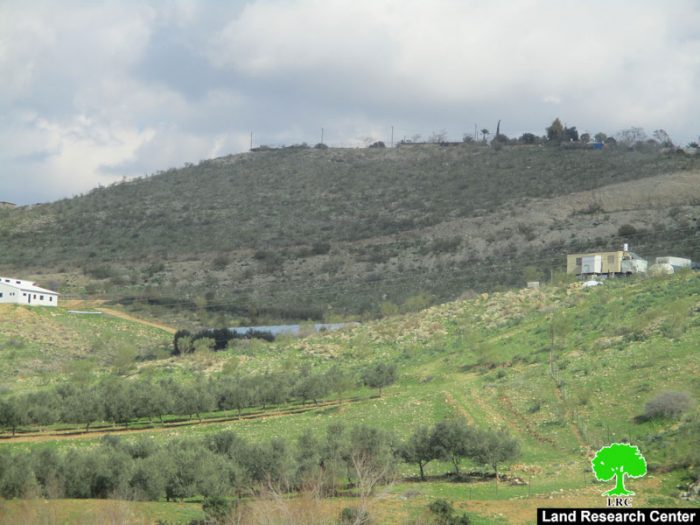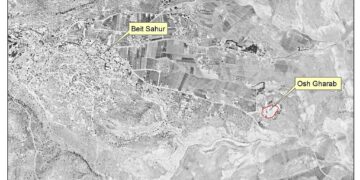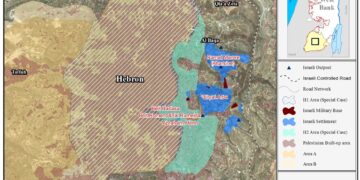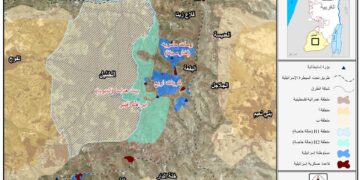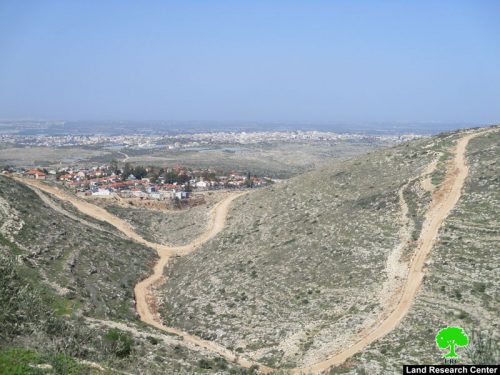- Violation: establishing new outpost
- Location: Wad AL-Malih- Tubas governorate
- Date: February 01, 2017
- Perpetrators: Rotem colony
- Victims: residents of Wad Al-Malih
Details:
Israeli inhabitants of colonial blocs that are founded alongside the Palestinian Jordan Valley areas continue on expanding towards Palestinian lands. It is reported that some Rotem colonists put hands on parcels of lands in Khirbet Al-Farisiya area for the sake of establishing a new outpost. Noteworthy, the perpetrators set up two caravans in the area as the first step to takeover more land to expand on.
Member of the Municipal Council of Tubas, Omar Einabusi, said the following:
" What Rotem colonists did is a violation against Palestinian lands, they area racing time and impose a de facto on the ground that will lead to the establishment of new outpost".
It should be noted that the government of Israeli Prime Minister Netanyahu is to approve a "legalization bill" for random outpost all across the West Bank.
Reportedly, the new outpost is 800m away from Rotem, which suggest that the gap area is threatened of confiscation for colonial interests.


Photos 1-2: the new outpost relative to Rotem colony
About Rotem:
The colony of Rotem was established in 1984 on the eastern mountains of al-Malih area that overlooks Jordan and al-Shri'a area. It used to be a military base for the Israeli occupation, which later changed into an agricultural colony located on more than 80 dunums. Despite that the colony does not have a huge population, yet its residents have higher privileges and services than other colonists elsewhere in. privileges are represented in agricultural lands, housing and the facility in marketing agricultural products. On the contrary, Palestinians area denied simplest rights such like the right to decent living of dignity.
Palestinian Jordan Valley:
The area of Palestinian Jordan Valley enjoys a strategic location, moderate climate, fertile soil and abundance of water. As per location, the area is to the northeast of West Bank and extends from occupied city of Bisan to Jericho governorate in the south. It is edged by Jordan River from the east and Tubas and Nablus governorates from the west. The total area of Palestinian Jordan Valley mounts up to 1,024,722 dunums, of which 13,000 dunums (1%) are the built-up area, where 62,876 inhabitants live in 27 Palestinian communities.
Land Research Center sees Israel continuous expansion on colonies in the West Bank and Jerusalem at the expense of Palestinian and lands a flagrant violation of Human Rights and all international laws and conventions, which prohibit disposition of public properties in occupied countries.
UN Resolutions
UN Security Council Resolution 242 of 1967: calls for
- the Withdrawal of Israel armed forces from territories occupied in the recent conflict;
- Termination of all claims or states of belligerency and respect for and acknowledgment of the sovereignty, territorial integrity and political independence of every State in the area and their right to live in peace within secure and recognized boundaries free from threats or acts of force." [4]
UN Security Council Resolution 449 of 1979: the Security Council determined:
- "that the policy and practices of Israel in establishing settlements in the Palestinian and other Arab territories occupied since 1967 have no legal validity and constitute a serious obstruction to achieving a comprehensive, just and lasting peace in the Middle East"
UN Security Council Resolution 452 of 1979: states that
- "the policy of Israel in establishing settlements in the occupied Arab territories has no legal validity and constitutes a violation of the Fourth Geneva Convention relative to the Protection of Civilian Persons in Time of War of 12 August 1949" and "calls upon the Government and people of Israel to cease, on an urgent basis, the establishment, construction and planning of settlements in the Arab territories occupied since 1967, including Jerusalem."
UN Security Council Resolution 465 of 1980:
- It expressed concern at Israeli settlement policy in the Arab territories and recalled resolutions 237 (1967), 252 (1968), 267 (1969), 271(1969) and 298 (1971). It further called upon the State and people of Israel to dismantle such settlements. The resolution calls on all states ‘not to provide Israel with any assistance to be used specifically in connection with settlements in the occupied territories’.
UN Security Council resolutions in regard to Israeli colonies:
UN Security Council resolution 446, article 3 " Calls once more upon Israel, as the occupying Power, to abide scrupulously by the 1949 Fourth Geneva Convention, to rescind its previous measures and to desist from taking any action which would result in changing the legal status and geographical nature and materially affecting the demographic composition of the Arab territories occupied since 1967, including Jerusalem, and, in particular, not to transfer parts of its own civilian population into the occupied Arab territories;"
- Un Security Council resolution 452, article 3"Calls upon the Government and people of Israel to cease, on an urgent basis, the establishment, construction and planning of settlements in the Arab territories occupied since 1967, including Jerusalem;"
-
Un Security Council resolution 465, Strongly deplores the continuation and persistence of Israel in pursuing those policies and practices and calls upon the Government and people of Israel to rescind those measures, to dismantle the existing settlements and in particular to cease, on an urgent basis, the establishment, construction and planning of settlements in the Arab territories occupied since 1967, including Jerusalem;
Calls upon all States not to provide Israel with any assistance to be used specifically in connexion with settlements in the occupied territories;
-
Un Security Council resolution 242, Affirms that the fulfilment of Charter principles requires the establishment of a just and lasting peace in the Middle East which should include the application of both the following principles:
(i) Withdrawal of Israel armed forces from
territories occupied in the recent conflict;
(ii) Termination of all claims or states of belligerency and respect for and acknowledgment of the sovereignty, territorial integrity and political independence of every State in the area and their right to live in peace within secure and recognized boundaries free from threats or acts of force;
Prepared by
The Land Research Center
LRC

